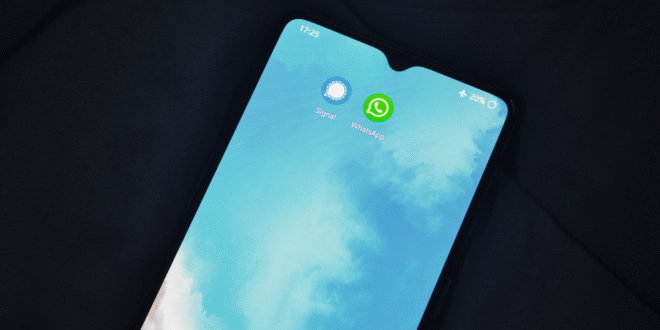Signal called WhatsApp’s new AI update a “privacy nightmare” — and the apps now feel worlds apart.Credit: Rahul Shah from Pexels via Canva.com
Most rivalries are usually fought behind closed doors. But not in this case. Meredith Whitaker, Signals’ president, took to social networks to criticize WhatsApp’s AI-powered latest update. She accused it of crossing the line into advertising. It was a public take-down, not a vague statement or corporate diplomacy.
WhatsApp’s latest push to integrate ads into its application and an AI assistant floating in the air is at the core of the issue. Meta frames this as an innovation, while Signal says it’s a betrayal. What’s really happening and why are these classes making such a lot of noise?
The public alert that ignited a fuse
This is not a blog post, nor an interview. Signal’s President sent a sharp tweetMeredith Whitaker did not hesitate to accuse WhatsApp of surveillance advertising, This is a direct attack on This is the latest attempt by the company to monetise their messenger. AI and advertising
What update is in question?
- WhatsApp The company has started experimenting with advertisements inside the tab for updates, where users usually find their statuses.
- Testing is underway AI Assistant That can float within the chats. It is optional and helpful.
- Whitaker and other privacy advocates see this as something completely different. Tracking is invasive.
Meta was first implementing AI chat assistants and now advertising is monetizing the platform. WhatsApp was founded on a free app that prioritized privacy.
Whittaker is convinced people deserve privacy And shows how AI chat assistants extract data under the disguise of convenience. Her message wasn’t just directed at WhatsApp — it was aimed at users, regulators, and anyone still assuming end-to-end encryption is the whole story.
Signal vs. Meta
Signal has positioned themselves as the anti Meta for many years. There are no ads or tracking and it does not retain metadata. Signal has remained true to its promise, unlike most messaging apps, despite the AI hype that has been sweeping through the industry. Whittaker didn’t just criticize WhatsApp’s tools, but what they represented.
- WhatsApp Two billion monthly usersEven a modest rollout can result in substantial revenue.
- The Signals Team views this as a Unique CostOne that measures the creeping surveillance, erosion of user trust, and normalised extraction of data.
This model has been criticized in court. Meta is facing numerous legal challenges in Europe over how it manages its data and consent and, specifically, GDPR rules.
- You can also find out more about the following: Germany, Ireland, NorwayMeta’s advertising practices, say regulators, bypass user choice.
- Instead, relying on the contractual necessity Justification for behavioral targeting
Meta considers this an innovation, Signal views it as an invasion, and the line between the two has never appeared more clear.
What does it mean for tech giants like Apple and Google?
Meta’s decision isn’t just about WhatsApp. It’s a signal to the rest the industry that users of its platforms, even those with the appearance of being private, can be used as monetization tools. What’s off-limits if WhatsApp – once seen as a safe space – is now open to ads and AI prompts?
- As regulators in Europe tighten their GDPR enforcement, this strategy comes with its own risk.
- Meta’s advertisement model can be a liability in the legal sense, and not just as a tool for business.
- Meta is already being accused by multiple EU bodies of bypassing real opt-in. Under the new frameworks such as the Digital Markets Act, they could become even more aggressive.
Meta risks its reputation as well, after spending years building trust following the Cambridge Analytica Scandal, the Facebook Papers and the recurring algorithmic controversy.
By rolling out ads in WhatsApp — a space many users associate with personal, private communication — it risks reigniting old doubts.
Signal, on the other hand, seizes the moment, with its leadership, philosophy and growing media appeal. It is securing its position as an alternative as well as a ethical application.
Why this debate is important to users
Most people use messaging apps to communicate with their friends, families, and co-workers. When AI assistants integrate into chats, and ads invade the status, boundaries will start to shift. What was once a private channel has not been redesigned to retain engagement.
Signals’ attack against WhatsApp is not just a PR stunt; it’s also a clear line between platforms that are resistant to data harvesting and business models that do it by default.
It’s not a question of whether AI or odds will change the apps, but if the users will recognise the original space when they are finished.
 Costa News Spain Breaking News | English News in Spain.
Costa News Spain Breaking News | English News in Spain.





